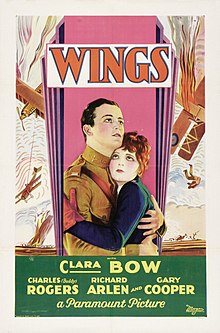Wings (1927 film)
| Wings | |
|---|---|

Film poster
|
|
| Directed by | William A. Wellman |
| Produced by |
Lucien Hubbard Adolph Zukor Jesse L. Lasky B. P. Schulberg Otto Hermann Kahn |
| Written by |
Titles: Julian Johnson |
| Screenplay by |
Hope Loring Louis D. Lighton |
| Story by | John Monk Saunders |
| Starring |
Clara Bow Charles "Buddy" Rogers Richard Arlen Gary Cooper |
| Music by | J.S. Zamecnik (uncredited) |
| Cinematography | Harry Perry |
| Edited by |
E. Lloyd Sheldon Uncredited: Lucien Hubbard |
|
Production
company |
|
| Distributed by | Paramount Pictures |
|
Release date
|
|
|
Running time
|
Original release: 111 minutes Restoration: 144 minutes |
| Country | United States |
| Language |
Silent film English intertitles |
| Budget | US$ 2 million |
Wings is a 1927 American silent war film set during the First World War produced by Lucien Hubbard, directed by William A. Wellman and released by Paramount Pictures. It stars Clara Bow, Charles "Buddy" Rogers, and Richard Arlen, and Gary Cooper appears in a role which helped launch his career in Hollywood.
The film, a romantic action-war picture, was rewritten by scriptwriters Hope Loring and Louis D. Lighton from a story by John Monk Saunders to accommodate Bow, Paramount's biggest star at the time. Wellman was hired as he was the only director in Hollywood at the time who had World War I combat pilot experience, although Richard Arlen and John Monk Saunders had also served in the war as military aviators. The film was shot on location on a budget of $2 million at Kelly Field in San Antonio, Texas between September 7, 1926 and April 7, 1927. Hundreds of extras and some 300 pilots were involved in the filming, including pilots and planes of the United States Army Air Corps which were brought in for the filming and to provide assistance and supervision. Wellman extensively rehearsed the scenes for the Battle of Saint-Mihiel over ten days with some 3500 infantrymen on a battlefield made for the production on location. Although the cast and crew had much spare time during the filming because of weather delays, shooting conditions were intense, and Wellman frequently conflicted with the military officers brought in to supervise the picture.
Acclaimed for its technical prowess and realism upon release, the film became the yardstick against which future aviation films were measured, mainly because of its realistic air-combat sequences. It went on to win the first Academy Award for Best Picture at the first annual Academy of Motion Picture Arts and Sciences award ceremony in 1929, the only fully silent film to do so. It also won the Academy Award for Best Engineering Effects (Roy Pomeroy). Wings was one of the first to show two men kissing (in a fraternal moment between Rogers and Arlen during the deathbed finale), and also one of the first widely released films to show nudity. In 1997, Wings was selected for preservation in the United States National Film Registry by the Library of Congress as being "culturally, historically, or aesthetically significant", and the film was re-released to Cinemark theaters to coincide with the 85th Anniversary for a limited run in May 2012. The Academy Film Archive preserved Wings in 2002.
...
Wikipedia
